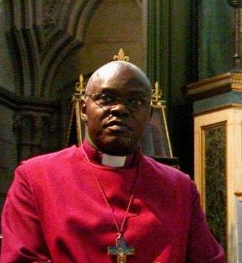
25 December 2006
19 December 2006
What will Canada's next election be like? The Economist thinks that Dion has a chance against Harper:
[Dion] is indeed bookish and lacking in charisma. But so is Mr Harper, and that did not stop him from turfing the Liberals out of office in last January's election. Mr Dion, said one commentator, is Mr Harper with a French accent. In an era when politics has degenerated into tawdry glitz, Canada seems to have bucked the trend. The next election campaign promises to be a real thumb-sucker.
Read more here: The geek shall inherit.
14 December 2006
Does the Australian Labor Party's selection of Kevin Rudd as its leader mark the desecularization of Australian politics? Paul Kelly considers this possibility: God at the heart of ALP's new strategy.
12 December 2006
My employer, Redeemer University College, really ought to consider adopting this Latin phrase as its new motto: Omnia in Christo constant. Or might that be too similar to that of a neighbouring institution?
What would it be like to live to see the 7th generation of one's descendants? This woman knew: Woman listed as world's oldest person dies at 116 in Memphis nursing home. And I'm sure she must have sent every one of them a birthday card each year.
08 December 2006
That's what's written on the licence plates in this western-most province, and it's an accurate description. I just came back from nearly a week there, as the guest of Trinity Western University, where my former colleague Mike Goheen currently teaches. I had the honour to deliver the Lamblight Lecture, titled "Globalization: Where are We Headed?," as part of a series sponsored by the Geneva Society. Everyone there was most hospitable, even going out of their way to ensure that the ground was covered with snow to make me feel more at home. What more could I ask?
Here are some photos of my time there:


This was one view of the mountains as seen through the trees of the TWU campus.

On tuesday Mike and Marnie and I had lunch at a restaurant in the coastal town of White Rock, not far from the border with Washington state. White Rock is a heavily touristed town during the summer months, but less so during the winter.

Here I am on the boardwalk at White Rock, with the inlet between BC and the US in the background.

I was fortunate to take this lovely shot of the sun setting over the Pacific.

It is claimed that Fort Langley is the oldest town in BC. It is another tourist town rather similar to Niagara-on-the-Lake, Ontario, but a bit less upscale.

I don't know whether this is in Fort Langley or not, but this is the lovely view from the Glover Road bridge over the Bedford Channel.

I took this photo from the gate at the Abbotsford Airport yesterday while waiting for the plane to return to Hamilton. This was my first visit to BC, which means that I have been to exactly half of Canada's provinces.
This evening Nancy and I had the pleasure of sampling a bottle of homemade mead, a gift from our good friend, Sir Bruce. What a nice way to spend a wintery evening with the family. It's good to be home again.
05 December 2006
This should be good news for Venezuela's poor: Chavez Promises to Eradicate Poverty Through Socialism. One wonders why nobody thought of this until now.
03 December 2006
In a stunning upset over previous frontrunner Michael Ignatieff, Stéphane Dion is the new leader of the Liberal Party. Thus the historic pattern continues since 1887 (except for a few months in 1919) of alternating party leadership between an anglophone and a francophone. We shall see whether Ignatieff remains in politics or returns to academia. And we shall see how Dion stacks up against Harper.
01 December 2006
Check out today's article in Comment, Living with Liberalism: six strategies for faithfulness, co-authored by a certain obscure Upper Canadian political scientist and his part-time colleague. Here's a brief snippet to whet the reader's appetite:
For Christians living in North America, the notion of being in exile may not seem immediately relevant. To be sure, we are still a covenant people, but we are not defined by ethnicity or attachment to a particular piece of land. Nevertheless, Augustine's recognition that we are severed from the tranquility of order—and even our own recognition of the brokenness of our communities—should confirm the continuing reality of exile. The need to pray continually to the LORD for the larger communities in which we find ourselves—as well as acting on their behalf—is at the heart of living as a Christian in a society dominated by any secular ideology, including liberalism.
Here is a story that would warm the heart of Gus Portokalos and confirm his every prejudice: Ancient Greeks charted skies with mechanical calculator. Opaaaa!
30 November 2006

Dr. Rowan Williams may well be remembered one day as the Archbishop of Canterbury who was unable to prevent the Anglican Communion splintering. His probable successor, Ugandan-born Dr John Sentamu, currently Archbishop of York, could go down in history as the man who infused a sorely-needed gospel message into a dying Church of England. Damian Thompson has published a fascinating analysis of the relationship among three prelates here: The archbishop's days are numbered. Much as the Irish reputedly re-evangelized Europe after the fall of the western Roman Empire, so might Africans come to re-evangelize a secularized Europe. Pray God this might come to pass.
Earlier this month two Redeemer alumni testified before a House of Commons subcommittee on human rights concerning the plight of imprisoned leaders of a suppressed independent trade union in Cuba. For those interested, a transcript of their testimony has been posted here.
Perhaps Turkey, with its poor record on religious freedom, would fit into Europe after all, if this story is any indication: Court upholds Nazi-era ban on homeschooling.
27 November 2006
Some 25 thousand Turkish citizens spent yesterday strengthening their country's case for admission to the European Union.
25 November 2006
The Conservatives have long had a reputation for being also-rans to the dominant Liberal Party. Now Prime Minister Stephen Harper appears bent on following in Liberal leadership-hopeful Michael Ignatieff's footsteps by moving to recognize "Quebeckers" (not Québec!) as a nation. Historian Michael Bliss believes that this constitutes nothing less than an attack on Canada. Although I disagree with Bliss's vilification of asymmetrical federalism, I believe his analysis of the implications of the different uses of nation in the Canadian context is worthy of note.
Later: Theresa was a bit alarmed reading the National Post's headline: "Canada under attack." This set the stage for Daddy to teach her two lessons: (1) the persistence of Québec separatism; and (2) the reality of editors using deliberate overstatement to sell newspapers. This conversation will surely make our eventual talk about the facts of life seem dull by comparison.
23 November 2006
On the first of this month, two umbrella labour organizations, the International Confederation of Free Trade Unions (ICFTU) and the World Confederation of Labour (WCL), disbanded to form a single body, the International Trade Union Confederation (ITUC). Because the Christian Labour Association of Canada was a member of the WCL, which had christian and pluralist roots, it is now de facto a member of ITUC, something which it shares, ironically, with those unions affiliated with the Canadian Labour Congress (CLC).
Given my ethnic Greek background, I am thoroughly accustomed to asymmetrical metres such as 5/4 and 7/8 time. All the same, I found that the rhythm of this delightful piece, composed by a Norwegian in the Bulgarian style, didn't come easily and took some time to pick up on. It alternates measures in 10/8 and 11/8 time.
For those interested, here are four articles of mine that have recently come out:
- "Socialism," in the New Dictionary of Christian Apologetics;
- "Center for Public Justice" and "Russell Amos Kirk," in the Encyclopedia of Modern Christian Politics; and
- "Persuaded, Not Commanded: Neo-Calvinism, Dignitatis Humanae, and Religious Freedom," in Catholicism and Religious Freedom.
21 November 2006

The Right Rev. Ralph Spence, Bishop of the Anglican Diocese of Niagara, has been awarded the title of Herald Extraordinary by Her Excellency the Right Honourable Michaëlle Jean, Governor General of Canada. Bishop Spence thereby becomes a member of her household. Whether he will actually be moving in to Rideau Hall remains unclear.
Incidentally, Spence designed the crest for Redeemer University College (shown at left) some 25 years ago.
20 November 2006
This is from last friday's entry by Jim Wallis on the God's Politics blog:
I believe that religion does indeed have a great contribution to the nation’s moral discourse on public life, but religion must be disciplined by democracy. That means that we don’t claim that our religious authority must be everyone’s or dictate their moral or political fate. Rather, religious people must win the debate, just like everybody else, about what is best—not for the religious community or only faith-inspired citizens—but for the common good [emphasis mine].
For a brief moment some thirty years ago, I was an enthusiast for Wallis' approach. This was long before he published a best-seller, and it was just before his flagship magazine, the Post-American, changed its name to Sojourners. I was enamoured by its vaunted radicalism and prophetic tone at a time when I was becoming disillusioned with the American civil religion so many Christians in that country accepted at face value.
Now I freely admit that I have changed in the ensuing decades (albeit not on civil religion), but I find myself wondering whether Wallis himself has modified his message since then. Perhaps I'm reading too much into it, but to argue that "religion must be disciplined by democracy" simply does not sound all that prophetic to me. Of course I understand what he's trying to get at with the above-quoted paragraph. Nevertheless, he seems to be making democracy the grand arbiter of what sorts of claims by people of faith are acceptable in the public square.
Furthermore, he ignores a long tradition that sees democracy in some sense as part of the problem. One thinks in this respect of the warnings of Alexis de Tocqueville and John Stuart Mill against the dangers of majoritarian tyranny. Indeed it would seem more "prophetic" (if I may be permitted that word) to recognize that a democracy undisciplined by a christian worldview is itself a potential danger to the common weal, as Robert Kraynak argues in the first part of his Christian Faith and Modern Democracy.
In his recent review of God's Politics, Paul Marshall points out that the Old Testament prophets called God's people back to obedience to his law. By contrast, contemporary Christians claiming the prophetic mantle are usually not similarly focussed. Wallis in particular is hardly proclaiming "thus saith the Lord" to his compatriots. Quite the contrary, he is urging people of faith to temper their claims for the sake of the common good, whatever he might mean by this.
Yet if all people are in the grip of some faith, whether or not it is conventionally labelled religious, why then would Wallis' warning not also extend to the followers of secularizing political ideologies claiming for themselves hegemony over the public square? Should liberalism and socialism also be "disciplined by democracy"? Or is the problem only with those who believe in a transcendent God with the temerity to tell his image-bearing creatures how they ought to live? If Wallis holds to the latter position, then one wonders what exactly he is calling people back to and in what sense he might still profess to be engaging in prophetic activity.
Rumour has it that my friend Gideon Strauss will shortly be posting this sign in his office:

Next thing you know he'll be wearing overalls and a straw hat to work.
18 November 2006
I was recently astonished to discover that many of my students appear not to be able to write in cursive. This hampers them during examinations when time is of the essence and they need to write quickly. When I was an undergraduate back in the dark ages, we wrote out, not only our exams, but our term papers in longhand, typing them up only when we had them completed and properly edited. Nowadays it seems that everyone composes on the computer keyboard, as, admittedly, do I myself. This article confirms my impression that Cursive [is] nearly a lost art. I would be interested to know how many readers of this blog, especially the younger ones, actually write in cursive.
15 November 2006
From Robert T. Miller:
A man is not a hypocrite because he violates a moral norm in which he sincerely believes. President Clinton, I am sure, believes that adultery is wrong, and he violated the norm against it in his dalliance with that woman, Ms. Lewinsky; but this made him an adulterer, not a hypocrite. Similarly, decent parents think they ought to be patient with their children, but an overworked mother who snaps at her child at the end of a long day is guilty of impatience, not hypocrisy. Violating norms we sincerely accept does not make us hypocrites. If it did, hypocrisy would not be a peculiar kind of wrongdoing but a concomitant of all wrongdoing.
13 November 2006
This might well be more significant than the development of the personal computer or the blackberry: CSIRO develops air guitar t-shirt. And just in time for Christmas when we're all puzzling over what to give our young male friends and relatives. Here's the company's podcast describing this groundbreaking invention.
10 November 2006
The Ted Haggard case calls attention to an important issue addressed in this Associated Press article: US evangelist sex scandal raises questions about 'superstar' megachurch pastors. I myself have never been an enthusiast for independent church congregations, especially of the "megachurch" variety. There is something unhealthy about a huge congregation revolving so heavily around one person's ministry. There is often little oversight, and certainly not from outside the congregation, since there is no denominational machinery that might provide it. At its worst this sort of arrangement can produce a cult of personality. However, I think the second statement below is not entirely accurate:
Nearly all megachurches are independent from a denomination — an asset for their flexibility, but a liability when it comes to checks on power. By contrast, mainline Protestant denominations vet clergy credentials and have elaborate systems of church tribunals, similar to civil courts, that discipline errant ministers.
I do not know what the word errant is intended to convey here, but the larger protestant denominations have mostly given up on the idea of doctrinal error, even in their own leadership. The Anglican Church of Canada, as just one example, has no means of reining in a rogue bishop. The irony is compounded when one considers that the Greek word επίσκοπος (bishop) literally means overseer, thus raising that ancient question of who will oversee the overseers. Unfortunately the Anglican Church has not answered this adequately in its own ecclesiastical polity.
09 November 2006
George W. Bush now has a minority government and is in the process of shuffling his cabinet.
08 November 2006
To be honest, I had not heard of the Rev. Ted Haggard until his name made it into the news a few days ago. The one-time pastor of New Life Church and the president of the National Association of Evangelicals has resigned both positions, admitting to having committed sexual indiscretions. By now this is an old story and very nearly a cliché: the publicly visible evangelical leader who is brought down amidst charges of hypocrisy, an occasion for schadenfreude amongst those who dislike the man's message and now apparently have further reason to ignore it.
Three years ago in this space I asked: "Have you ever noticed that when charges of hypocrisy are levelled against someone, it is almost always in the interest of loosening standards rather than tightening them?" Indeed I quite like what Francis J. Beckwith has to say in The Case of Ted Haggard, an article worth reading in full:
For Jesus, hypocrisy is clearly wrong, but it is a wrong intimately tied to a type of moral and spiritual triumphalism, just the sort that one finds in the writings of those who gleefully celebrate the moral failings of Pastor Haggard. Those who think of the detecting and condemnation of hypocrisy as sport, which is the dominant understanding of the liberal-secular chattering class, are not serious about the wrongness of hypocrisy. For such seriousness requires a tragic understanding of the human condition, that one is just as susceptible to sin's temptation as any other, and that it is only by God's grace and the support of the church that we can find forgiveness, redemption, and the strength to carry our cross. But the liberal-secular chattering class does not believe any of this. So, their detection and condemnation of hypocrisy is disingenuous at best and mean-spirited at worst.
A sinner has fallen, and for that we should mourn. It is certainly not a cause for smugness or superiority in those so eager to condemn. Contrary to popular opinion, hypocrisy is not the unforgivable sin. Nor is sexual sin. With repentance of both comes forgiveness in Jesus Christ, which should be our prayer for Haggard.
Later: I had not seen these videos when I wrote the above entry. Admittedly, these make it difficult not to conclude that Haggard is guilty of wilful deception more than mere hypocrisy. Still, my prayer is for his repentance and restoration.
06 November 2006
In my previous post on this topic, I argued for adopting a mixed-member proportional (MMP) electoral system for Canada, and offered two reasons. More reasons follow below.

Third, although it is not necessarily an intrinsic part of MMP, the German variety provides for a 5 percent exclusion clause. German citizens have two votes, one for a local candidate representing a single-member constituency and another for a party list, as shown at right. Although many Germans split their votes, casting one for a deputy representing one party while voting for another party's list, they tend to cast both votes for the same party. If a party wins fewer than 3 single-member seats and less than 5 percent of the vote on the list side, it will receive no party-list seats at all. If, however, the party receives 3 or more single-member seats or succeeds in getting more than 5 percent of the list seats, it will receive the full number of seats to which it is entitled on the list side. The end result is a parliament that is roughly proportional, though not precisely so.
The reason for the exclusion clause is to prevent splinter parties and extremists from cluttering up the Bundestag. In the aftermath of the Second World War, when Germany had suffered through a dozen years of nazi misrule, a mechanism seemed necessary to prevent a resurgent national socialist party from entering parliament, as well as to put a premium on co-operation amongst would-be partisan groupings within the context of larger and more broad-based parties. This, it was hoped, would prevent the sort of cabinet instability plaguing the Weimar Republic between 1919 and 1933. More than half a century later, we can judge that MMP in Germany has been a success.
Admittedly, it has not succeeded everywhere. The Russian Federation has used a form of MMP since 1993, along with an exclusion clause. Unfortunately, because most political parties there tend to revolve around the personalities of local figures rather than around a programme commanding a nationwide following, up to half the electorate has gone unrepresented because their parties have not succeeded in surmounting the hurdle posed by the exclusion clause. As a consequence, next year's parliamentary elections will be contested on a straight party list system, which is almost certainly not appropriate for a country as large and diverse as Russia. We'll see how it works when the time comes.
Fourth and finally, MMP is more likely to be accepted within the North American context than, say, STV or a provincial/state party list system, as favoured by Skillen. Because single-member seats would continue to be contested, it would be less disruptive of something with which voters are by now thoroughly familiar. At this point, I would tend to favour dispensing with a party-list vote altogether and simply compensating with additional seats those parties with fewer seats than would be justified by their proportion of the popular vote. The end result would be not precisely proportional, but certainly more proportional than is currently the case. Little would change for the voters themselves, but they would know that, with their "losing" votes being combined to create extra seats, they would not be wasting their votes, as they effectively do now. This would almost certainly boost voter turnout in the two countries.
I might add that past editorials in The Globe and Mail have been on-side of adopting MMP here in Canada. Here in Ontario a Citizens' Assembly on Electoral Reform is getting off the ground, and public consultations are to be held. British Columbia went through a similar exercise, and a referendum last year came close to mandating the adoption of STV, largely through Nick Loenen's efforts.
I wonder, however, if it might be better for Ontario citizens to vote initially on the principle of PR versus FPTP, and then, if the former is approved, hold a second preferential ballot on the form of PR to be adopted. Some of the no votes in BC might have come from people who liked PR but disliked STV. Let's not make the same mistake here.
There is, of course, a possible drawback in adopting PR within the Canadian context, where we are accustomed to single-party "majority" governments that generally have the support of only between 38 and 43 percent of the electorate. Our last two governments have been single-party minority governments. If PR were adopted, we would probably never have another majority government again. Yet we could not keep having elections every year or so. This is where we reach the limits of institutional reform and where our developing unwritten constitution would have to fill in. Though we Canadians have had little experience with multiparty coalition governments, we would have to overcome our reluctance to see one party consorting with the "enemy" and consider this possibility. In fact, such coalition governments would be necessary if the political system as a whole is to continue functioning properly.
In the meantime, I plan to follow the work of the Ontario Citizens Assembly on Electoral Reform, and I may even make a submission.
05 November 2006
At the Locke Street Festival some weeks ago, the Church of St. John the Evangelist invited passers-by to write on a flip chart any question they might wish to ask God. One of these was "Why are there wars?" Noting that I would be participating in a workshop on war and peace at the upcoming ICS Worldview Conference, David Anderson, the rector, asked whether I would address this question in a sermon on sunday, 12 November, the day after Remembrance Day. I agreed to do so and will thus preach at next sunday's 9.30 am service. All are welcome to attend. The church is located at the northwest corner of Locke Street and Charlton Avenue here in Hamilton.
02 November 2006
I am pleased to announce that Mr. Brian M. K. Dijkema will be teaching Canadian Foreign Policy (POL 308) at Redeemer University College during the winter term of 2007. Mr. Dijkema is a graduate of Redeemer's political science programme and is currently working for the Christian Labour Association of Canada. He will shortly be receiving a master's degree from the Institute for Christian Studies in Toronto.
If you have a paper copy of today's National Post, please see page A-21 where Dijkema has published an opinion piece titled, Cheering on a Dictator. Here is the summary: "Cuban workers have no rights. So why does the communist regime enjoy the support of the Canadian Labour Congress?"
Congratulations are due to Mr. Dijkema for both of the above items.
31 October 2006
30 October 2006
Given his professed liberal individualism, Liberal leadership hopeful Michael Ignatieff has surprised me and troubled many others by proposing that Québec be declared a nation within Canada. Anyone who had spent more than a few years of his adult life in this country would have known better than to reopen the thorny constitutional question gratuitously for partisan political purposes. Historically, Québec has always been treated as une province pas comme les autres, but recent efforts to entrench this status in our constitution acts have come to nothing and have only inflamed tempers. Then again, Ignatieff might not have known this. He was away at the time, wasn't he?
29 October 2006
Our family almost never watches television, but last evening we did watch W-Five on CTV, a disturbing look at The Pied Piper of Hamilton. A number of local families, one of which is known to us, are experiencing considerable heartache over loved ones who are members of this cult and have cut off all ties with them. It's a familiar pattern we've seen elsewhere over the decades. Everyone involved needs our prayers. Κύριε ελέησον!
27 October 2006
24 October 2006
Here is one more possibility with respect to the origin of our family's surname. It may come from the Turkish word, kuyu, meaning well, and could thus refer to an ancestor's occupation. In the absence of birth records, or at least access to such records if they exist, this can only be speculation.
23 October 2006
The current issue of the Public Justice Report carries an article by James W. Skillen, Election Hype and Political Stagnation. Writing within the American context, Skillen notes that his fellow citizens are increasingly disaffected from electoral politics and especially the two major parties. This shows up in an increasing number of professed independent voters and in low voter turnout. Why bother to vote when one's own vote for a losing candidate is effectively a wasted vote?
In response Skillen proposes the adoption of proportional representation (PR) for elections to the House of Representatives. Of course there are different forms of PR. The one Skillen favours is a state-by-state party list system in which voters would vote, not for an individual candidate, but for a party and its programme. This would eliminate the need for the periodic redrawing of electoral boundaries, along with the dangers of gerrymandering for partisan purposes.
I am pleased to count Skillen as something of a mentor, as I acknowledge in the preface to my Political Visions and Illusions. I agree with him wholeheartedly on the need for a more proportional electoral system in those countries, such as the US and Canada, where it is lacking. However, I disagree with his proposed form of PR, namely, the party list system. Why does he favour this particular reform? Skillen isolates a key problem:
Our system, after all, is one that was designed from the start to frustrate the power of the national government. Only one national official is elected by American voters as a whole, and that is the president. In November, all those running for Congress—both House and Senate—will be elected by the voters in single districts or within a single state's borders. The priority of each representative who is elected will be to function in a way that benefits his or her district or state. Senator Lieberman (D-Conn.), who argued on the one hand for lobbying reforms and election-finance reform, nonetheless made clear during his losing primary race against Ned Lamont, that the bacon he has brought back to Connecticut from Washington is great for Connecticut. My point is that we do not have national parties with an ability to govern for the national good in the United States. Voters, therefore, have little if any control over what Congress does as a body of interest-group brokers, each of whom is conscious of the need to serve his or her home district or state. All that voters can do in the few districts and states where competitive races will be held this year is to throw out one interest-group broker for another and wait to see how he or she will play the same game in Washington.
There can be no doubt that logrolling is a significant obstacle to doing public justice through the legislative process in the US. We in Canada are not as prone to this notable defect, primarily because of our more disciplined political parties and the Westminster system that places a premium on party solidarity. Garth Turner's recent expulsion from the Conservative Party's parliamentary caucus is a case in point and would be unlikely to occur south of the border.
Of course, not everyone is keen on giving more power to political parties, and it might be that, if Skillen were living and working in Canada, he might come to a different conclusion. For example, Nick Loenen, who comes out of the same Reformed tradition as Skillen and myself, favours the single transferable vote (STV), because it empowers ordinary citizens rather than party élites. Too many Canadians believe that their local member of parliament, far from representing their interests in Ottawa, does little more than to represent Ottawa back to them, as if he or she were a mere satrap of a distant imperial government.
I myself could live with either STV or a party list system, but I would much prefer a German-style mixed-member-proportional (MMP) system. Why?
In the first place, it potentially combines the best features of our current single-member system and PR. The mere fact of local, rather than fully national, representation in a parliamentary body will not necessarily lead to logrolling, if the institutional machinery, both within the party and within the legislature, is in place to facilitate a more expansive deliberation on the substantive public interest. Perhaps even more significant than institutional factors is a supportive political culture recognizing, along with Edmund Burke, that a representative is a trustee of the public interest and not merely an agent of a particular territorially-defined group of citizens. But institutional reform of any kind will not necessarily bring about this change of attitude.
Second, it recognizes that one cannot so easily cordon off local from national interests in the way that supporters of the party list system appear to assume. Again, a Canadian example should suffice to illustrate this. In 1980 Prime Minister Pierre Trudeau firmly believed that enacting his National Energy Programme was in the interest of the Canadian polity as a whole. Yet Albertans disagreed and came to be persuaded that it lopsidedly benefitted the more populous provinces of Ontario and Québec at the expense of their own economic interests. A party list system would have done little if anything to ensure that the less populous provinces were not left out in the cold. Pursuing the national interest cannot mean ignoring local needs and aspirations, which must be taken into account by policy-makers. Skillen appears tacitly to acknowledge this by allowing for a state-by-state list system rather than a nationwide list system, as in Israel and the Netherlands. Yet, with Skillen, I heartily agree that the national interest cannot be reduced to a mere aggregate of local interests.
Next: More reasons to favour MMP.
20 October 2006
Well, that may be a bit of a stretch, but Turner is thinking of joining the Greens.
17 October 2006
In music could the concept of the grace note be rooted in a semi-pelagian worldview?
I can't count the number of people I've heard say this in recent days: "Thank goodness we don't live in Buffalo!" And we're not yet a month away from summer.
16 October 2006
I have been asked to post the following announcement:
Dr. Egbert Schuurman will be visiting Redeemer University College and will give a public lecture entitled "Christian Life in a Technological Culture". Dr. Schuurman is a professor of Reformational philosophy in the University of Wageningen, the Netherlands. He holds degrees in engineering (Delft) and philosophy of technology (Free University, Amsterdam). He is a member of the Dutch Senate for the Christian Union party. Dr. Egbert Schuurman has published many books, among others Perspectives on Technology and Culture (1995), Technology and the Future (1980), and Faith and Hope in Technology (2003).
During his time at Redeemer, the public is invited to hear him speak on the following occasions:
-Tuesday 24 October, Redeemer Room #214 at 7 pm: Public Lecture on "Christian Life in a Technological Culture" (open to the general public)
-Wednesday 25 October, in the auditorium at 11 am: message in the Redeemer chapel service (open to the general public)
Depression and medication
Following my own experience with depression in the late spring and early summer, I was interested to read this article by Fr. George Morelli, Overcoming Depression: Cognitive Scientific Psychology and the Church Fathers. There are good things in the article, including the isolation of the eight cognitive distortions occurring in the mind of someone suffering from depression. Fr. Morelli suggests cognitive therapy and spiritual intervention as means of trying to alter these distortions.
Yet something is missing. Apart from the author's single reference to the possible need for "psychopharmacological treatment" in some cases, nothing more is said of the role of medication in the treatment of depression, anxiety disorder and similar conditions. This is not an inconsequential omission. Why might Fr. Morelli see fit not to discuss this element? The obvious answer is that he is merely a psychologist and not a psychiatrist, with the medical component thus lying outside his field of competence.
Nevertheless, I wonder whether there is not more at work here. Could the inattention to medication be rooted in a defective anthropology playing up the cognitive at the expense of the corporeal? I have heard of more than one case in which well-meaning Christians have advised those suffering depression to wean themselves off medication on the assumption that "dependence" on it is the sign of a defective spiritual condition. However, I doubt very much they would extend this same counsel to a heart patient needing medication to survive.
When I was going through the worst moments in May and June, I found it difficult to feel gratitude to God for his blessings to me, because everything appeared in such a negative light. I had to struggle to thank God on a cognitive level while feeling exactly opposite. This was the most vexing element of my depression. Was I undergoing an internal spiritual struggle? Most certainly, yes. However, once I was on a high enough dose of the medication, I began to feel dramatically better, freshly aware of the joys of life and the grace of God. I could then much more easily feel grateful to him for all his gifts, including my wife and daughter, my work at Redeemer, and faithful friends and family who prayed for me during those dark weeks.
Did the medication tip the balance in the spiritual struggle? Did it help to bring my emotions into line with my cognitive grasp of the world? It certainly seems to have done so, yes. I find Dooyeweerd's philosophy especially helpful here, because, rather than assuming that spiritual struggles take place in a creational vacuum, he recognizes the different levels in which everything functions. According to his modal analysis, the biotic is foundational for the affective/psychic mode, which is in turn foundational for the logical/analytical mode. This suggests to me that in my case the medication altered the biological component by raising the levels of serotonin in the brain, making it possible for my emotions to return to normal, which then brought my thought processes back into line.
Could it work the other way round, namely, attempting to change one's emotions, and ultimately one's physical health, by addressing the thought processes? That's what cognitive therapy is all about, and I understand that it can be effective. Nevertheless, in my case healing worked upwards from the more basic level rather than working downwards, as it seems to do in some cases. This would appear to indicate that spiritual battles do not occur in a platonic realm of ideas separate from the tangible world as we experience it.
As in Job's case, physical infirmity can be the occasion for the afflicted to doubt God's love for them, thus precipitating a crisis of faith. Conversely, addressing such infirmity may help to resolve such a crisis, though I, along with many others, can testify that the grace of God does come even in the absence of good health and a receptive emotional state. Is this analysis less spiritual than one relying on, say, the power of prayer alone? I don't think so. Nevertheless the complex interconnections between the various aspects of the human person raise issues that would seem, at the very least, to require further reflection.
This is good news: New mouse found in Cyprus. The report fails to indicate whether this newly discovered species is a Greek Cypriot or Turkish Cypriot rodent.
14 October 2006
Three decades ago I took voice lessons while a student at Bethel College in Minnesota. I thus learned to sing in the bel canto style associated with classical western music. Of course, bel canto is hardly the only vocal technique in existence. For example, the singers of Greek folk music, or δημοτικά τραγούδια, generally have raspy voices that seem to have been filtered through the rocky soil of the Peloponnese. Most, if not all, folk singing is far removed from a style more suited to the Italian opera house than to the village.
Commercial popular singing differs from one place to the next as well. In North America I have noticed over the years that male singers tend to sing loudly and at the top of their range, thereby seeming to suppress the masculine character of their voices. (The Bee Gees are perhaps an extreme example!) This I have never been able to understand, but it seems to have begun just over half a century ago with the birth (or perhaps the mainstreaming) of rock and roll.
By contrast Brazilian singers take an entirely different approach, as heard in this video of João Gilberto's exquisite rendering of Ary Barroso's classic Aquarela do Brasil and in this one of Antonio Carlos Jobim singing his own Desafinado. Both sing softly and very nearly at the bottom of their range. Of course these are men of an earlier generation. Has the Brazilian popular singing style come to mimic the North American in the intervening decades? Someone closer to the genre may be able to answer this better than I.
10 October 2006
Though I do not know nearly as much as I would like about the subject, I have long had an affinity for Brazilian music, both classical and popular. Now from that largest South American country comes an excellent jazz band, called 11 Cabeças (Eleven Heads), which deserves to be better known in North America.
Fantástico! If you liked this piece, click here for more. I understand that 11 Cabeças recordings are not yet available in the northern hemisphere, but let's hope that they will be soon.
What better way to spend Thanksgiving Day than by hiking through the Dundas Valley Conservation Area. The autumn leaves appear to have peaked early this year, so we decided to take advantage of yesterday's lovely weather by trekking through the woods. Here are some photos of our adventure. I was particularly pleased by the second.





09 October 2006
and grant prosperity.
Even the grasslands yield a harvest
and grow luxuriantly.
The hills adorn themselves with gladness,
the meadows with their herds.
The valleys with their grain are covered;
they sing with joyful words.
Psalm 65:11-13
06 October 2006
Ever since I came into contact with the Acton Institute of Grand Rapids, Michigan, I have been disturbed by its apparent tendency to view the free market as a panacea and to overextend its validity beyond its proper sphere, especially in its approach to education and the environment. However, this recent commentary by Kevin Schmiesing represents an encouraging development and could prompt a rethink on my part: The Baby Market. Writes Schmiesing:
The market is a wondrous thing. There is no better instrument for the calibration of human productivity and ingenuity to human needs and wants. But its advantages turn pernicious when it encompasses human goods that should never be reduced to monetary values.
Excellent. I hope Acton as a whole will follow Schmiesing's line of argument as it tackles other issues as well.
03 October 2006
On the face of it, this is a bewildering report: WCC asks Israel to recognize head of Orthodox Church of Jerusalem. These lines jump out at the reader: "Under long-standing agreements, the election of the patriarch of Jerusalem, the oldest and largest church in the Holy Land, is endorsed by the Israeli, Jordanian and Palestinian authorities." Um, isn't it about time to change these longstanding agreements? The notion that an entire church body would allow itself to become paralyzed by the failure of a government to act seems ludicrous.
02 October 2006

Tuesdays with Morrie
I somehow managed to miss this book when it first came out nearly a decade ago: Mitch Albom's Tuesdays with Morrie. Morrie Schwartz was Mitch's sociology professor at Brandeis University in the late 1970s, and the two of them grew close during that time, meeting on tuesdays to discuss the great issues of life. When Mitch graduated, he left his mentor behind to pursue fame and fortune as a sport writer for the Detroit Free Press, seemingly forgetting what he was taught: that relationships are more important than worldy success.
Years later, as Mitch was watching television, he learned from a Nightline report that Morrie was terminally ill with ALS. Regretting his own failure to maintain contact over the years, Mitch made a belated effort to renew his friendship with Morrie, going so far as to spend 14 successive tuesdays with him as his body gradually deteriorated. In the process he learned one last lesson from his old mentor: what it means to die, as well as how to live well in the love of friends and family in the meantime. Here's Morrie himself:
[G]iving to other people is what makes me feel alive. Not my car or my house. Not what I look like in the mirror. When I give my time, when I can make someone smile after they were feeling sad, it's as close to healthy as I ever feel. Do the kinds of things that come from the heart. When you do, you won't be dissatisfied, you won't be envious, you won't be longing for somebody else's things. On the contrary, you'll be overwhelmed with what comes back (p. 128).
This book was commended to me by one of my own former students whom I am blessed to call a great friend. The relationship depicted in it felt familiar to him, and he thought I should read it too. I am glad I did. Even more than the contents of Morrie's last lessons, I was moved by the evident affection that grew once more between him and Mitch in his final weeks.
When I first started teaching just under two decades ago, I was surprised at how much I would come to love my students and how much more they would return to me in loyalty and affection. Indeed I can easily say that if I had to give up all but one thing of my academic career, that one thing would be the ongoing relationships with my students and former students which I've found so enormously gratifying. I think Morrie would have said the same thing.
For anyone who has loved a former teacher or for any teachers who have loved their students, this is a must read.
28 September 2006
What better way to demonstrate to Benedict XVI that Islam is not, after all, a religion of violence: Greek Orthodox Church Attacked With Pipe Bombs In Gaza.
More than two decades ago, while living in South Bend, Indiana, a young couple showed up at the South Bend Christian Reformed Church, of which I was a member, insisting that they were "Reformed Baptists." They had decided to worship at SBCRC, because its Reformed confessional stance outweighed for them their differences in understanding the sacraments. They brought with them numerous stories of fellow Baptists who were converted to Calvinism. I recall expressing puzzlement as to which element of Calvin's teachings had worked such a change in these Christians. Their response? TULIP.
This attachment to the doctrines represented by the famous floral acronym seems also to be behind the stories recounted here: Young, Restless, Reformed. It should be noted that virtually everyone in these stories is a Baptist of some sort. Given this fact, three groups of questions would appear to merit consideration.
(1) If so many Baptists, especially in the Southern Baptist Convention, are coming to embrace Reformed Christianity, will they not eventually have to confront — and perhaps even embrace — Calvin's teachings on the sacraments and ecclesiology, from which they still evidently dissent? If salvation comes, not from our decision for Christ, but from his choosing us, then wouldn't it be more appropriate to adopt a view of baptism as a sign of God's grace rather than one reflecting a voluntary profession of belief?
(2) The early Reformers recovered the Psalms in the liturgy and commissioned poets and musicians to render them in a form easily singable by an ordinary congregation. Why then does the article fail to mention an increased appreciation for and use of the Psalms in public worship? Has this not been part of the experience of these converts? If not, why not?
(3) Will these Reformed Baptists not also have to think through, along with Abraham Kuyper, the implications of God's sovereignty for every area of life? Will they come to have an appreciation for the larger implications of the cultural mandate (Genesis 1:28)? Or is this ostensibly "enlarged view of God's authority" applicable only to "evangelism, worship, and relationships"?
I suppose I'm ultimately asking this: As these Baptists become more Reformed, will they eventually cease to be Baptist in any meaningful sense? That, of course, cannot be predicted in advance. However, what appears to be lacking in these zealous converts is a sense of the catholicity of the church and of the faith. We do not yet see in them an enlarged sense of the body of Christ, which might make for a more ecumenical emphasis. Nor do they appear to recognize that the church did not disappear between the 1st and 16th centuries. They have adopted a narrowly theological approach to Calvin's teachings, without, as far as I can tell, having a real burden for the institutional church, the sacraments, and a world and life view that touches, well, the whole world and all of life.
25 September 2006
Hegel's ideas are alive and well in the person of Danny Kruger, who applies the German philosopher's dialectic to British politics in The right dialectic. Kruger argues that the revolutionary triad of liberty, equality and fraternity well represents the ongoing quarrel between left and right, with the former focussing on equality and the latter on liberty. Both groups value fraternity, even if they interpret it differently. At base it is
the sphere of belonging, of membership, the sphere of identity and particularity. It exists in civil society, in the arena of commercial and social enterprise, of family and nation. It concerns neighbourhood, voluntary association, faith, and all the other elements of identity that relate us to some and distinguish us from others. It concerns culture.
Kruger's essay is helpful in giving us a sense of the direction of the Conservative Party under its current leader David Cameron. What Kruger appears to misunderstand is the origin of the terms left and right in the horseshoe-shaped parliaments he erroneously views as attempts to overcome them. They certainly did not originate at Westminster, as he seems to imply.
Thanks to Paul Bowman for alerting us to this article. Bowman has asked me whether Kruger's musings represent a movement within the Conservative Party in a christian democratic direction. Possibly, but these ideas are by no means new within the Party. Former leader William Hague (who bears an uncanny resemblance to Kelsey Grammer of Frasier fame) set them forth in a speech titled, "Identity and the British Way," since removed from the Conservative Party website but which I mention in my book.
24 September 2006
This morning our family was privileged to attend Divine Liturgy at All Saints of North America Orthodox Church in Hamilton's east end, courtesy of our friend, John Loukidelis, a reader of this blog. The congregation is quite small, but extremely friendly. Thanks are due them for their generous hospitality. The Priest-in-Charge, Fr. Geoffrey Korz, preached a sermon urging his hearers to recognize that love of God is not just something to be cordoned off from daily living but must extend to the whole of life.
On another note, the Church of St. Mary the Virgin, in Berry Pomeroy, Devon, England, sang one of my versifications of Psalm 95 at Morning Prayer today. It will be sung again at the 11.15 am service on sunday, 23 October. I'd love to be there myself to hear it. I understand that the St. Mary's building was the setting for the final wedding scene in Ang Lee's cinematic version of Sense and Sensibility.
22 September 2006
Remember Lew Daly's Compassion Capital, on which I blogged here? Well, now it's in book form, titled God and the Welfare State, to be released next month. Daly has offered to have a copy sent to me by the publisher once it's out. I look forward to reading it.
Can it be true? The New Pantagruel is closing shop. And so soon after this. I don't think we're in Kansas anymore, Toto.
21 September 2006
I must admit to being ambivalent about Richard John Neuhaus' comments on Ronald Dworkin's Artificial Happiness: The Dark Side of the New Happy Class. Although I usually agree more than I disagree with Neuhaus — at least on specific issues — in this case I fear he is labouring under a misunderstanding of the nature of the illnesses that prompt people to take antidepressants such as Prozac or Zoloft. Though I've not read the book at issue, I suspect that neither Dworkin nor Neuhaus has ever suffered from depression, which is considerably more than just unhappiness. When properly used, these medications help to free the mind, not just from unhappiness, but from anxieties gone into overdrive, which can adversely affect how one approaches one's work, relates to other people, and views past and future.
I find myself wondering whether Dworkin and Neuhaus would make the same judgements on people suffering from, say, diabetes or hypothyroidism who need insulin or a hormone supplement to keep themselves alive and functioning. Or even those who take Tylenol for a headache. Are these people to be labelled artificially healthy or pain-free? We all know, of course, that pain helps to alert us to potentially deeper health issues needing attention, and a painkiller may lull us into ignoring the root causes of a malady. I have no doubt that psychoactive medications can be abused. They certainly should not be used to make "people feel good about their disordered selves and their disordered lives." (However, I'm not sure they are even capable of this — of soothing the consciences of people unhappy with their own sins. I doubt any medication can do so.) Yet I believe we are justified in thanking God for the medications that have been developed over the decades to ease pain and cure illness. This includes psychoactive drugs.
18 September 2006
From ages 6 to 14 I aspired to become an architect. As a child I used to spend hours drawing floor plans of homes, fancying myself the heir of the great Frank Lloyd Wright, who once lived in the city of my birth, Oak Park, Illinois. Taking a drafting course in high school convinced me that architecture was not for me after all. Nevertheless, I still have an interest in the subject. When my niece married a Chicago architect a few months ago, he and I discovered we had much to talk about. Moreover, when some friends visited my home many years ago, they noticed that much of the art on my walls consisted of cityscapes and buildings. I hadn't put two and two together before that, but I realized then that I still care about the buildings where we live our lives from day to day. A week ago last friday Comment published a thoughtful article by David Greusel, Why architecture matters. It's a great piece and I can easily resonate with the concerns expressed therein.

In late 1976 I visited Prague (right), the capital of what was then still called Czechoslovakia. Immediately I fell in love with this perfect jewel of a city, with many of its buildings dating back to the 14th century when the Emperor Charles IV made it his capital. Because it was spared the destruction of the two world wars, it still retained its character — at least at its centre. Of course, three decades ago the country was under the communists, whose rule affected the architecture constructed between 1948 and 1989. Prague thus offered a fascinating contrast within its own borders. On the one hand was the old city, constructed in grand style befitting the seat of an emperor.
On the other hand, the periphery of the city suffered from the blight of a dour stalinist architectural style imported from the Soviet Union. For communists any human touches to our homes, schools, workplaces and public buildings are deemed remnants of a decadent capitalism, to be replaced eventually by a sternly proletarian functionalism divorced from the realities of human communities and the relationships nurtured therein.
We can be grateful that the communists saw fit to retain the late mediaeval heart of Prague, rather than effacing it altogether as they did the former East Prussian city of Königsberg, now known as Kaliningrad. This suggests that, despite the depredations of a destructive worldview, the rulers of Czechoslovakia recognized the treasures they had inherited from their precommunist predecessors and rightly sought to preserve them for future generations.

Yet there are places in the noncommunist western world where the architectural legacy of previous generations is too easily cast aside when economic imperatives dictate. For example, my home city of Chicago (above left in 1976) boasts some of the best known cutting-edge architecture in the world. However, in my personal library I have a nostalgic volume titled, Lost Chicago, by David Lowe, filled with more than 200 pages of photographs telling the sad story of a city's vanished heritage. Of course, some of this perished in the Great Fire of 1871, but most of it was deliberately destroyed to make way for something newer and ostensibly better.
Back in 1984, when the decision was made to demolish the old Chicago & Northwestern terminal on Madison and Canal Streets, and build in its place a metal and glass skyscraper to be called the Northwestern Atrium Center, I wrote a letter of protest to the Chicago Tribune, subsequently published in the 23 June issue of that year. Here is the letter, with which, apart from a few rhetorical flourishes, I still agree:
It saddens me to see the stately old Chicago & Northwestern terminal about to be demolished. To try to soften the blow, the railroad has put up signs and banners cheerily proclaiming, "We're on our way up," meaning, of course, that where the old station now stands will soon be erected yet another of those characterless glass office buildings with an enclosed shopping court at its base. One more link with the city's past will have been sacrificed barbarously at the altar of progress and the almighty dollar.
Chicago is rather like a vain movie star, afraid to let the world see the signs of its age and refusing to grow old gracefully. Every generation the city seems compelled to undergo a facelift, allowing itself to live on an illusion of perpetual youth while eradicating any continuity with its own past. Not every building should be preserved merely because it is old, of course, but the reckless compulsion to destroy and rebuild is not healthy either. Not only has such a city lost touch with its own soul, but it is hardly acting as a fit caretaker and steward of the valuable resources and treasures bequeathed by past generations. When will Chicago learn to value its own heritage instead of glorifying its rootlessness?
More than two decades later, as I look back on what I wrote then, it occurs to me that we need to address an important question: Given that we cannot and should not save every building that has ever been constructed, what criteria should we use to decide which to preserve and which to replace? I'd love to hear some discussion of this.
17 September 2006
It's official: Dwarf planet gets new name. The distant world temporarily nicknamed "Xena" is now called Eris, after the Greek goddess of discord. In the meantime Pluto has been further downgraded by being assigned a number: 134340. I guess Pluto and Eris can keep each other company out there in the
Pope Benedict XVI was unwise to quote Byzantine Emperor Manoel II Palaeologos, who had the temerity to criticize efforts to spread faith at the point of a sword. Just because Constantinople was at the time under siege by the Ottoman Turks was no excuse for the Emperor to let his prejudices get the better of him. As for the Pope, he should definitely make a clearer apology.
What happens when worship becomes a mere tool for evangelism and outreach? Fr. John Parker takes a hard-hitting look at efforts to market the church in Guide for the Cineplexed. Writes Parker:
The marketed church offers just what everyone wants: the music I want (or don’t), the time I want, the length of service I want, the type of language I want, the style of music I want, the amount of intimacy and responsibility I want, and in some cases, even the pastor I want. But is the gospel a message about the satisfaction of wants?
The marketed church confuses Sunday worship and catechism with evangelism and outreach. What is the difference? Mere Christian Sunday worship has always been for the Christian community (the baptized) to offer thanks to God, to sing his praise, and to feed on the Word. Evangelism has been done by conversation in the marketplace, preaching in the public square, but even more, simply by the witness of increasingly holy lives.
14 September 2006
My friend Paul Marshall has an article worth reading in this month's Christianity Today: The Problem with Prophets. I would love to see him develop his thoughts further in a longer essay or even a book on the subject.
12 September 2006
Do we Canucks have something to learn from the Aussies? Mark Steyn clearly thinks so.
If any of my students dares to wear something made of this material in the classroom, I will make them take it off then and there.
10 September 2006
Prof. Ian Hunter, who has spoken at Redeemer in the past, has left the Anglican Church for Rome. My question for him is: why not Constantinople?
Is it unusual for a 7-year-old to be humming Dave Brubeck's Blue Rondo à la Turk and Take Five at the breakfast table? The remarkable thing is that I was easily able to recognize them.
Here is my own homage to Brubeck, titled Rondo Rouge à la Grec (© 2002 David T. Koyzis).
08 September 2006

Gilead
Last week I read Marilynne Robinson's Pulitzer Prize winning Gilead on the recommendation of a friend. Gilead is a small town in western Iowa, just over the border from Kansas. (In reality, of course, Iowa does not share a border with Kansas, but this geographical fiction is no less plausible than Gilead itself.) Not a conventional novel with a clear plotline and an obvious ending, it instead takes the form of a journal kept by a dying minister of the gospel written for his 7-year-old son whom he will not live to see grow up.
The Rev. John Ames is the third generation of men by that name to have pastored the local Congregational church. Born two decades before the end of the 19th century, he is married briefly in the first years of the 20th. Alas his first wife dies in childbirth, as does the infant daughter. Only when he is in his 60s does he remarry a woman much younger than he and, as he approaches his three-score-years-and-ten, experience the unexpected grace of fatherhood once again.
The beauty of the book lies not in its plot, but in the portrayal of its characters. Robinson flawlessly assumes the voice of an elderly man, persuading the reader that, among other things, the writer really did accompany his father on a journey to Kansas in 1892 to find his grandfather's grave. The most complex character is his namesake, John Ames "Jack" Boughton, the son of his lifelong friend, "old Boughton." Having disgraced the family in his youth and moved away from Gilead, he has now returned to town 20 years later, with unknown motives. Ames fears Jack's influence on his wife and son after he has passed on. Much of the latter part of the book finds him preoccupied with Jack's sudden and unnerving presence in his family's life and his interior struggle over whether he should warn his wife about him.
Oddly enough, however, Ames' second wife, Lila, along with the other women in the book, is not as vivid a character as one would expect from a husband's diary. It may not be fair to call her one-dimensional, yet we know little of her motives and what makes her tick. That's the one thing that does not ring true in an otherwise compelling narrative. On the other hand, given that it is written for his son, who when he reads it will already have known his own mother, Ames might well deem it unnecessary to delve too deeply into her character for his benefit.
There is much to love in this book.
First, although I have never lived in a small town, I was taken with the setting and the relationships nurtured by it. Imagine living in one place one's whole life and enjoying the proximity of lifelong friendships. In a mobile society friendships are generally cultivated for a time and then have to be maintained in attenuated form over a distance as someone moves away. (I have never entirely reconciled myself to this fact of contemporary life.) But Ames and old Boughton — best friends from childhood — grow old together and seemingly face death at nearly the same moment.
Second, I was moved by the father-son relationships portrayed. With remarkable insight, Robinson accurately depicts the love and loyalty, as well as the tensions and conflict, between the generations of a family. Again this rings true.
Finally, Robinson perceptively explores the unfathomable mystery of divine election in the lives of her characters, especially the wayward Jack and Ames' disbelieving brother Edward. Why does God's grace seem to bypass those who, try as they might, cannot bring themselves to believe? Why do others, such as Lila, come to the faith in so ordinary a fashion after sitting through successive weeks of less-than-riveting sermons? The author asks and considers these questions but wisely refrains from trying to answer them.
Robinson's last (and first) novel, Housekeeping, was written a quarter of a century ago. Let's hope she doesn't wait as long to publish a third.
06 September 2006
Given the already falling birthrate in Europe, this award-winning advertisement from Belgium would seem to be counterproductive, even from a marketing standpoint. After all, if everyone took its message seriously there would be no one left in another 25 years to purchase the featured product.
Followers
Blog Archive
-
▼
2006
(281)
-
▼
December
(12)
- 'Born that man no more may die'
- Stéphane versus StephenWhat will Canada's next ele...
- Religion and politics down underDoes the Australia...
- Paul said it firstMy employer, Redeemer University...
- Mrs. Methuselah passes onWhat would it be like to ...
- 'Beautiful British Columbia'That's what's written ...
- A true innovationThis should be good news for Vene...
- Liberal leadership race overIn a stunning upset ov...
- Whence life?Meteorite may have seeded life. Um, ha...
- Alternate addressBecause Redeemer's server has bee...
- The latest from CommentCheck out today's article i...
- The Greeks were there firstHere is a story that wo...
-
►
November
(23)
- An African prelate for England?Dr. Rowan Williams ...
- Defending Cuban labour leadersEarlier this month t...
- I spoke too soon. . .Perhaps Turkey, with its poor...
- Turkish protestSome 25 thousand Turkish citizens s...
- English irregularitiesWhy is it that someone who p...
- Harper puts his foot in it tooThe Conservatives ha...
- Global solidarity expandedOn the first of this mon...
- Lebanon in crisisI suppose we are justified in ass...
- Norge-Bulgaria 10/11Given my ethnic Greek backgrou...
- Recent publicationsFor those interested, here are ...
- Vexillologist honoured by Queen's representativeTh...
- Wallis on religion and democracyThis is from last ...
- A change of heart?Rumour has it that my friend Gid...
- The lost art of cursive handwritingI was recently ...
- On hypocrisy . . . againFrom Robert T. Miller:A ma...
- 'Why are there wars?'As indicated some days ago, l...
- Big breakthroughThis might well be more significan...
- Ecclesial oversight . . . or the lack thereofThe T...
- In Canadian terms. . .George W. Bush now has a min...
- Hypocrisy: the unforgivable sin?To be honest, I ha...
- Which PR? Part IIIn my previous post on this topic...
- Why are there wars?At the Locke Street Festival so...
- Dijkema doingsI am pleased to announce that Mr. Br...
-
►
October
(20)
- Reformation DayEin' feste Burg
- Ignatieff puts his foot in itGiven his professed l...
- Dominion Christian CentreOur family almost never w...
- SunriseThis was the view from the east window of m...
- David T. Welldigger?Here is one more possibility w...
- Which PR?The current issue of the Public Justice R...
- Communists woo Garth TurnerWell, that may be a bit...
- Nature and graceIn music could the concept of the ...
- I'll stay in Hamilton, thank youI can't count the ...
- Schuurman at RedeemerI have been asked to post the...
- Depression and medication
- Zoologists of the world, rejoiceThis is good news:...
- Singing stylesThree decades ago I took voice lesso...
- Onze CabeçasThough I do not know nearly as much as...
- Holiday hikeWhat better way to spend Thanksgiving ...
- ThanksgivingYou crown our year with rich abundance...
- A positive turn for ActonEver since I came into co...
- Church immobilizedOn the face of it, this is a bew...
- Take the Anglican challengeThis one is for Anglica...
- Tuesdays with MorrieI somehow managed to miss this...
-
►
September
(23)
- The Pope was wrongWhat better way to demonstrate t...
- Baptists becoming Reformed?More than two decades a...
- A Tory on fraternityHegel's ideas are alive and we...
- Church notesThis morning our family was privileged...
- God and the welfare stateRemember Lew Daly's Compa...
- What? No more ad hominem?Can it be true? The New P...
- Artificial happiness?I must admit to being ambival...
- ArchitectureFrom ages 6 to 14 I aspired to become ...
- At the edge of the solar systemIt's official: Dwar...
- Reaction to Pope's speechPope Benedict XVI was unw...
- Marketing the churchWhat happens when worship beco...
- Marshall on evangelical activismMy friend Paul Mar...
- Lessons from the AntipodesDo we Canucks have somet...
- A word to the wiseIf any of my students dares to w...
- Five years laterUniversity of FloridaLest we forge...
- Crossing the TiberProf. Ian Hunter, who has spoken...
- A budding musician in our household?Is it unusual ...
- GileadLast week I read Marilynne Robinson's Pulitz...
- Needed reform on the wayThis is good news: Harper ...
- What if they gave a world and nobody came?Given th...
-
▼
December
(12)



